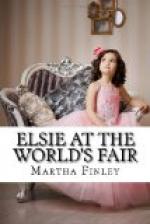It was large, but they were congenial and greatly enjoyed being together, sharing the same pleasures of sight and sound.
In another half hour they were all on shore enjoying a second view of the lovely Peristyle and Court of Honor, through which they passed on their way to the Ferris Wheel, the ride in which they found so delightful that at the earnest solicitation of little Ned they retained their seats during a second revolution. Then they left it and walked on to the Wooded Island.
“I want to take you to the Hunter’s Cabin,” said Harold. “See, yonder it is.”
“What! that old log building?” exclaimed his sister Rose, catching sight of it among the trees. “Who cares to look at such a thing as that?”
“I do,” he returned lightly, “since it is a museum and memorial of Daniel Boone and Davy Crockett,—two historical characters who were very interesting to me in my youth,—and also gives one a very good idea of the manner of life of our Western pioneers forty or more years ago.”
He led the way as he spoke, the others following. They found that the building consisted of one large room divided by a rope into two apartments, a public and a private one. There was a broad fireplace such as belonged to the dwellings of the pioneers of fifty or more years ago; there were beds and settees made of stretched skins, and skins of wild animals covered the floor; there were also tin dishes, candles, a stool made of a section of a log, and such cooking apparatus as was used in the kind of dwelling represented.
The cabin was occupied by a hunter who wore long hair and a wide-brimmed felt hat.
He was ready to answer questions, many of which were asked by the younger members of our party, who, as well as their elders, seemed much interested in this representation of pioneer life in the olden times.
“Where now?” asked Mr. Dinsmore as they left the Hunter’s Cabin.
“I think Master Neddie here would enjoy a look at the ostriches,” remarked Herbert, with a smiling glance at the rosy, happy face of his little nephew, who was trudging along with his hand in that of his father.
“Oh, yes!” cried the child in a tone of eager delight. “I should like to see them ever so much!”
“Then if no one objects, that is where we will go,” said Harold, and as the only rejoinders from the other members of the party were those of assent, he led the way.
“Is it a very expensive entertainment?” asked Walter soberly.
“Costs all of ten cents apiece,” replied Herbert. “An enormous sum, but one cannot expect to see Old Abe, General Grant, Jim Blaine, and Grover Cleveland for just nothing at all.”
“Oh, uncle!” cried little Elsie, “are all those great men there? Oh, no, of course they can’t be—’cause some of them are dead. I know it was dear, good Mr. Lincoln they called Old Abe, and that a wicked man shot him long, long ago; and that General Grant was sick and died.”




